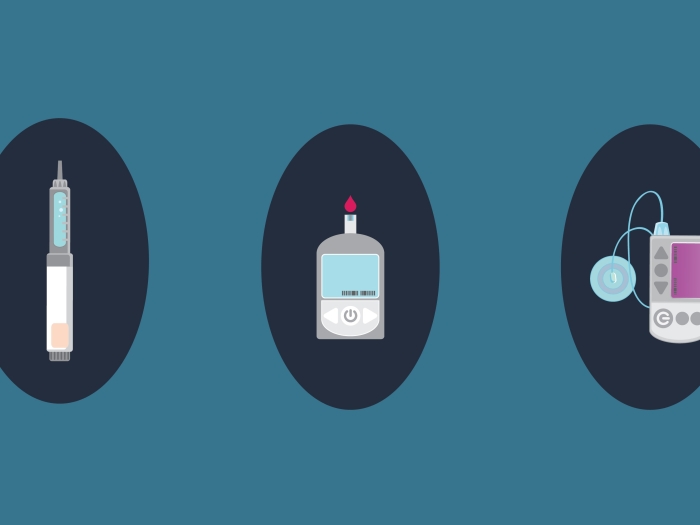Because of his type 1 diabetes diagnosis at 5 years old, endocrinologist Scott Soleimanpour devoted his career to those with the condition.
8:00 AM
Author |

A childhood diagnosis led to a life's work for one U-M physician.
"I remember being 5 years old at a family wedding and becoming super thirsty," says Scott Soleimanpour, M.D., assistant professor of endocrinology at the University of Michigan Health System. "I mean, imagine the worst thirst you could ever have. Like you're out in the desert, and then multiply that times 10."
Soleimanpour didn't know what his thirst meant at the time. But that day would significantly alter his life forever.
His parents realized something was incredibly wrong, and Soleimanpour's father, a physician, sought medical treatment for his son. After a diagnosis of type 1 diabetes, Soleimanpour spent two weeks in an intensive care unit as a medical team worked to get his sugars under control and to place him on insulin treatments.
"They told me I have a lazy pancreas, and it isn't making enough insulin," Soleimanpour says. "It was a life-changing event that put me on the path to working with diabetes. I wanted to help people also suffering with this condition."
We sat down with Soleimanpour to learn more about being a diabetes researcher and physician affected by the disease, and how he uses his personal experiences to help others with diabetes.

When did you decide to become a researcher and physician of diabetes?
Soleimanpour: At the young age of my diagnosis, I saw dynamic teams of endocrine doctors, educators, nurses, etc. It also helped that my parents were always interested in the latest scientific advances.
I decided to go medical school and wanted to be a pediatric diabetes doctor. I had an advisor at the time that presented me with a research opportunity and said, "Do you want to look for a cure, or administer a cure someone else has discovered?" It changed my perspective and made me decide to try out the research side of things. After a fellowship at the National Institutes of Health, I realized I love taking care of patients, but I knew I could also make a larger impact by committing the majority of my activities to research.
What would you consider to be the most unique thing you've researched so far?
Soleimanpour: I'm very fascinated by new models or novel discoveries. Mostly what you see in the clinical setting, you've seen before, so it's nothing new. In research, we observe things no single other person on this planet has ever seen before — unless they just haven't told everyone yet!
I think the best thing is to be able to take information, even if it's from the most mundane experiment, and translate it into something important. For example, while I was working at the University of Pennsylvania, we worked on a study that demonstrated how beta cells (cells that store and release insulin) live and survive in type 1 diabetes. Our finding was just one piece in a much larger puzzle, but it continued to set the standard for other groups that we need to pay more attention to beta cells if we're going to make actual change in diabetes.
What do you wish people understood about diabetes?
Soleimanpour: I think from a research perspective, it's the belief people have that type 1 and type 2 diabetes are 100 percent dissimilar. In fact, there are more similarities between the two than people realize. The reality is that beta cells are not working effectively or efficiently in both types.
We're trying to change the thinking that type 1 is just an autoimmune disease. It's a beta cell disease, too, and knowing it's both is important while we work on finding new cures. For type 2, we're trying to fight the dogma that you get it because you're fat. Only 20 percent of overweight people have type 2 diabetes. Yes, being overweight increases your risk, but there's something else that's going wrong, and that's those insulin-making cells in your pancreas that aren't working effectively.
What should people with diabetes now about their diet?
Soleimanpour: Caloric intake is very important for both type 1 and type 2 diabetes.
Patients will come into the clinic and tell us they're not eating a lot, but they need to monitor and restrict caloric intake, and be serious about losing weight. I've been there, too. I lost 65 pounds and really it was me being honest with myself and making the commitment.
Have a balanced diet, utilize exercise to make insulin work effectively for you, and eat in such a way that you're not having high peaks and low valleys in your sugar levels.
It's important for diabetics to empower themselves. You can't be a backseat driver with your diabetes.Scott Soleimanpour, M.D.
What's the best piece of advice you can give someone living with diabetes?
Soleimanpour: I would love to tell them there's a quick fix coming.
My best piece of advice would be it's important for diabetics to empower themselves. You can't be a backseat driver with your diabetes. Just doing what your doctor says and showing up at your next visit isn't enough. Technically, I'm your consultant. I'm not going home with you and making sure you're doing all the things we discuss, like eating right, checking your blood sugar, taking your insulin, etc. You make the decisions to treat yourself when you are empowered, take responsibility and work hard for yourself.
My fellow physicians and I know it's hard, me especially. Don't be a bystander, or it will become a runaway problem.

Explore a variety of health care news & stories by visiting the Health Lab home page for more articles.

Department of Communication at Michigan Medicine
Want top health & research news weekly? Sign up for Health Lab’s newsletters today!





